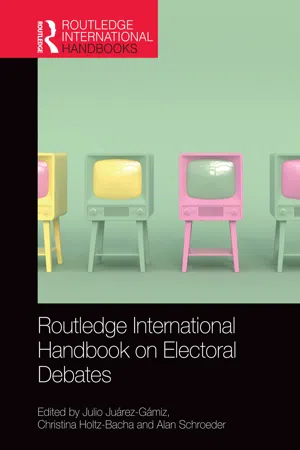1
INTRODUCTION
Televised Election Debates as Spectacle and Reflection
Stephen Coleman
Are televised election debates thrilling spectacles designed to simplify political choices for mass electorates or opportunities for citizens to engage in the hard work of individual and collective democratic reflection? Can they be both? What sort of normative criteria should be adopted in the appraisal of debates? Or should such evaluative criteria be pragmatic, eschewing lofty normativity? Much has been written about televised election debates over the past 80 years, usually as if their purpose is blindingly obvious. The objective of this chapter is to take a step back and ask what televised election debates are for. What part do they play in the messy improvisation of democratic culture? And how might we imagine them differently?
Most studies of televised election debates ignore these broad questions and focus on the simpler matter of who wins and who loses. Evidence is offered to show that debates have independent effects upon politically undecided citizens; upon voters with a weak allegiance to one party or candidate; upon viewers’ assessment of the character strengths and weaknesses of candidates, especially when the latter have had minimal media exposure before the debates; and upon close electoral races in which a relatively small number of votes might make a difference to the result (Katz and Feldman, 1962; Becker and Kraus, 1978; Chaffee and Choe, 1980; Geer, 1998; Blum-Kulka and Liebes, 2000; Pfau, 2002; Maier, Rittberger, and Faas, 2016; Baboš and Világi, 2018). While it is difficult to think of more than one or two quite exceptional examples of a televised leaders’ debate determining an election outcome, it would be unwise to conclude that debates merely reinforce preexisting preferences. In addition to these “political effects” studies, some scholars have focused upon what we might call “civic effects”. The latter focus upon the extent to which debate viewers are stimulated to take a greater interest in, or engage with, election campaigns. For example, Wald and Lupfer, (1978) famously wrote about “the presidential debate as a civics lesson”. In such a context, viewers were imagined as students of democracy, honing their civic skills with a view to becoming “better” voters. Televised election debates have been said to stimulate citizens to seek out additional information, talk to others about problems, policies and ideas raised within them, and experience an enhanced sense of confidence in their own political knowledge and capacity to engage in political action (McLeod, Bybee, and Durall, 1979; Lemert, 1993; Zhu, Milavsky, and Biswas, 1994; Benoit, Webber, and Berman, 1998; Jamieson and Adasiewicz, 2000; Weaver and Drew, 2001; Benoit and Hansen, 2004; McKinney and Chattopadhyay, 2007; McKinney and Rill, 2009; Cho and Choy, 2011; McKinney, Mitchell, Rill, and Thorson, 2013; Turcotte and Goidel, 2014; Van der Meer, Walter, and Aelst, 2016).
These functional studies were produced in the belief that everyone knew what televised election debates were for. It was assumed that these events would serve as edifying stimuli, generating positive effects that could only be advantageous to the health of democracy. Determining such effects would be a purely empirical matter. Problems begin to arise when there is disagreement about what constitutes a healthy democracy. Is it the role of democratic media to reinforce entrenched convictions or to unsettle them; to consolidate trust or to inspire skeptical questioning; to cast a spotlight on charismatic leaders or to embolden voters’ agency? How best to prepare for, conduct, and evaluate televised debates depends on how these questions are answered.
From its outset, a similar uncertainty surrounded the normative role of television as a mass medium. When television first emerged as a feature of political communication, the debate about its cultural significance was dichotomised in almost moral terms. Some saw television as a force for cultural good, bringing politicians closer to the people they represented, thereby creating a more accessible, inclusive democracy. Others saw it as a machinery of narcoticising distraction, leaving viewers vulnerable to demagogic manipulation. Among those who believed that the new medium would instruct and uplift viewers, especially in their civic roles, were scholars such as Charles Thomson (1956, p. 156) who enthused that “It seems certain that television offers an unexampled source for … the political education of the nation as one community”; John Scupham (1967, p. 136), the BBC’s first Controller of Educational Broadcasting, who argued that “Radio and television have shifted the emphasis of political controversy in the democratic countries from abuse to argument”; and Brian Groombridge, who in his manifesto for television as a vehicle for participatory democracy, argued that the medium could
